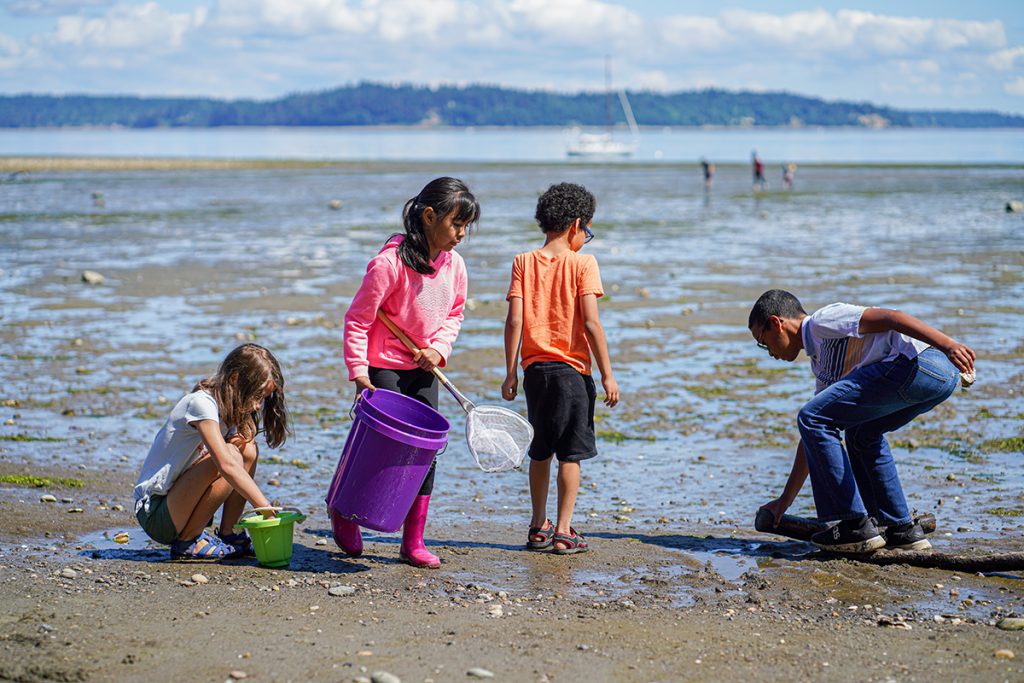VIBRANT HUMAN QUALITY OF LIFE
Statutory Goal: A quality of human life that is sustained by a functioning Puget Sound ecosystem.

We now have baseline information for all indicators of the Vibrant Human Quality of Life goal
Thanks to surveys of Puget Sound residents, we now better understand how people perceive the importance of Puget Sound for their quality of life. Survey data were first collected in 2018 and again in 2020 from thousands of people in the general population. Little change was detected between the two years. These surveys establish a baseline of subjective measures of human wellbeing. The economic indicators are derived from other, longer-term data sources for jobs and employment in natural resource industries. Though the Partnership has not set targets for indicators in this goal, they ideally should progress or increase over time, although there might be some complexity and trade-offs to achieve sustainability or resilience.
- Survey results show that Puget Sound residents have a strong sense of place. Most residents identify with and feel positively attached to the region’s natural environment.
- Residents with a strong sense of place are more likely to engage in stewardship behaviors. Over one-third of the Puget Sound population engages in stewardship behaviors that benefit the environment at least once a week.
- Residents’ opinions were split on how our government and other organizations manage the natural environment. Responses to questions about access to information, opportunities to influence decisions, and trust in policy makers ranged from strongly disagree to strongly agree.
- The region has seen overall growth among natural resource industries, mostly through growth in recreation and tourism. Gross domestic product in tourism and recreation has increased consistently each year since 2010. Combined product value, or prices paid to producers for timber, fish, shellfish, crops, and livestock, measured in the low billions annually from 2005–2018, with ups and downs from year to year.
- Aquaculture, agriculture, and recreation and tourism sectors all report growth in general employment and total wages from 2005–2018. Employment in timber and fishing, however, has flattened or declined.
- Natural resource industries support a higher percentage of wage and employment in small, rural counties that have relied on these industries in the past.
- Climate change is expected to impact human wellbeing across the region in numerous profound ways. Low-income, rural, Indigenous, and other communities are already experiencing climate-related changes to their wellbeing, with most of these populations relying on natural resource infrastructure (e.g., fisheries, forestry, agriculture) for economic security.
For more details about ecosystem conditions relating to this goal, please see our Story Map on Puget Sound Info.
Climate change poses a risk to human quality of life and equity
Climate change poses a high risk to most Vital Signs related to Vibrant Human Quality of Life. This includes Cultural Wellbeing, Economic Vitality, and Sense of Place. Good Governance is at moderate risk (Siemann and Binder 2017).
- negative impacts to fishing, foraging, first foods, traditional medicines, and cultural gatherings.
- negative impacts to natural resource-based industries, including fisheries, aquaculture, timber, and snow-based recreation tourism.
- reduced access to valued places or activities; and
- diminished emotional connection to natural resources due to worsening ecosystem conditions.
- increased frequency and severity of natural disasters that cause large social and economic disruption and undermine trust in government; and
- increased regulations that weaken people’s sense of freedom to make decisions about how the environment is managed.
 Signals from the 2020 State of Our Watersheds Report
Signals from the 2020 State of Our Watersheds Report
Climate Change Impacts Puget Sound and Tribal Traditional Practices: Today, Puget Sound watersheds are experiencing the effects of a changing climate and it is predicted that these effects are going to continue or accelerate into the future. Tribal communities are on the front line of the climate crisis as their traditional practices are now threatened by broad-scale and far-reaching environmental changes. The harms caused by climate change are compounded by ongoing damage to the ecological integrity and resilience of our watersheds. In the Pacific Northwest (PNW), the observed and projected trends include warmer air temperatures; shrinking glaciers and snowpack; lower summer streamflows; higher winter flood flows; shifts in streamflow patterns and timing; higher stream temperatures; larger and more frequent wildfires; warmer ocean temperatures; rising sea levels; and changing ocean chemistry, including ocean acidification and low levels of dissolved oxygen.

